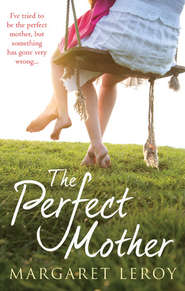По всем вопросам обращайтесь на: info@litportal.ru
(©) 2003-2025.
✖
Some Girls Do
Автор
Год написания книги
2018
Настройки чтения
Размер шрифта
Высота строк
Поля
Some Girls Do
Margaret Leroy
This book explores why, in these post-feminist days, otherwise confident and assertive women spend hours waiting for the phone to ring when they meet a man they like. It reveals the effects this passivity in courtship and relationships has on women’s sense of themselves, their self-image, concern with appearance, and their disgruntlement with men.Women’s lack of sexual assertiveness, particularly early in relationships, is one of the few areas to remain relatively untouched by feminist ideology. Leroy shows that this passivity has an overwhelming effect on women’s confidence which in turn has a bearing on their behaviour in all aspects of their lives.Looking at female fantasy, date rape, masochism, male responses and the media, and drawing on literature, interviews and research, she exposes hypocrisies, blows the lid on the women’s magazine industry, and finally suggests ways in which women can take control of their courtship rituals, becoming more at ease and assertive not just in this, but in all areas of their lives.‘Don’t go clubbing without it’ – Independent
MARGARET LEROY
Some Girls Do
Why Women Do – and Don’t –
Make the First Move
Copyright (#ulink_e39561bd-f370-542e-a70e-449e04352af1)
HarperCollinsPublishers 1 London Bridge Street London SE1 9GF
Published by HarperCollinsPublishers 1998
First published in Great Britain by HarperCollinsPublishers 1997
Copyright © Margaret Leroy 1997
The Author asserts the moral right to be identified as the author of this work
All rights reserved under International and Pan-American Copyright Conventions. By payment of the required fees, you have been granted the non-exclusive, nontransferable right to access and read the text of this e-book on-screen. No part of this text may be reproduced, transmitted, down-loaded, decompiled, reverse engineered, or stored in or introduced into any information storage and retrieval system, in any form or by any means, whether electronic or mechanical, now known or hereinafter invented, without the express written permission of HarperCollins e-books.
Source ISBN: 9780002555920
Ebook Edition © MARCH 2012 ISBN: 9780007484942
Version: 2016-06-20
Contents
Cover (#u9433cc44-7718-5a5c-b809-5d09518fa5f4)
Title Page (#u63497c68-c069-5296-ac14-ca21e8dcb841)
Copyright (#u1005a0a5-c34d-54c9-a620-5e43a45a6421)
CHAPTER 1: COURTSHIP TODAY (#ud3538077-4e66-58f0-aa01-cf54598fa7c4)
CHAPTER 2: WOMEN WHO DO (#u123a9e5b-e1bb-5026-a9e3-cc53db139ab2)
CHAPTER 3: WOMEN’S FEARS (#u2156d820-33a4-5606-aece-670cab605697)
CHAPTER 4: MEN’S DOUBTS (#litres_trial_promo)
CHAPTER 5: MYTHOLOGIES (#litres_trial_promo)
CHAPTER 6: LOOKS AND SMILES (#litres_trial_promo)
CHAPTER 7: DO WOMEN SAY NO AND MEAN YES? (#litres_trial_promo)
CHAPTER 8: MONEY (#litres_trial_promo)
CHAPTER 9: DANGER (#litres_trial_promo)
CHAPTER 10: HOW TO (#litres_trial_promo)
References (#litres_trial_promo)
Index (#litres_trial_promo)
Acknowledgements (#litres_trial_promo)
About the Author (#litres_trial_promo)
Also by the Author (#litres_trial_promo)
About the Publisher (#litres_trial_promo)
CHAPTER 1 COURTSHIP TODAY (#ulink_a86ed9cc-7640-521b-a2c3-73fcbcf18ecd)
I ASK men out,’ said Emma. ‘I’m doing my bit. I can’t understand why more women don’t do it. It feels so good to go out with somebody you’ve chosen.’
Emma is a teacher in her early twenties. She’s warm and friendly – but not unusually assertive. She’s pretty – but not particularly confident about her appearance: like so many women, she’s forever struggling to lose weight. She enjoys her sex-life – but she’s not particularly sexually self-assured. In most ways, she’s as full of self-doubt as the rest of us. Yet she asks men out: she finds it easy: and making the first move is a source of real pleasure in her life. She relishes her sense of achievement when she thinks, I chose him.
My conversation with Emma was the genesis of this book. It set me thinking how extraordinary it is that so few women make this move. Why is it still so difficult? What could help us to change?
Since talking to Emma, I’ve asked all the women I’ve met if they’ve ever asked a man out. All of them have wanted to – but few have ever done so: most said, ‘I simply couldn’t …’. Some of these women edit glossy magazines or manage social services teams or work in busy casualty departments. They feel strong, autonomous, entitled. In every other area of their lives, they’re in control: they shape what happens to them. But this they wouldn’t do. Unlike Emma, they don’t think it would feel good, and they can understand why more women don’t do it.
Even women in the age-group where it’s often assumed that sexual patterns are changing most rapidly said the same. Nineteen-year-old Natalie told me: ‘I do leave it up to the lad to make the first move – with telephone calls, the first kiss, everything – and if they don’t do it, well then it’s tough cheese isn’t it?’ Lucy, aged fifteen, said: ‘Girls could, yeah – they don’t though … It’s just that nobody does. I think it would be good but no-one has the courage to.’
There are a few Emmas in every age group, of course. Most of the men I talked to had been asked out by a woman – but usually only once or twice.
Women’s reluctance to ask men out does seem amazing. Over the past few decades, so much has changed in our sexual behaviour. Women have been setting limits and drawing lines in the sand. We’ve said no to male sexual violence and attempted to outlaw the darker expressions of male sexual initiative by establishing rape-crisis centres, taking action on child sexual abuse, legislating against sexual harassment. Some women have sought to set the sexual agenda with that effective act of vengeance, the kiss and tell, with its ‘That’s no way to treat a lady’ subtext. And many of us have been exploring our own sexuality – by reading collections of female fantasies, or going to orgasm workshops, or buying ‘Black Lace’ books, or photographing the male nude, or queuing up to scream at the Chippendales.
Most notably for this book, women have been imposing their own agenda on courtship by highlighting the risk of sexual violence within a dating relationship. This is the sexual change that is causing most controversy. It’s been suggested, most notably by Katie Roiphe in her book The Morning After, that awareness of the possibility of date rape creates a climate of fear which makes it harder for men and women to get close. As Martin Amis told an audience at Princeton University, ‘As far as I’m concerned, you can change your mind before, even during, but just not after sex’.
(#litres_trial_promo) The worry is that now women are changing their minds afterwards, and that sometimes the men involved will be wrongfully blamed – like Austen Donellan, who was threatened with expulsion from university after a woman he’d slept with claimed he’d raped her. Wisely he chose to be tried in a public court, and was acquitted.
But there were certainly casualties too under the old dispensation. And by and large it surely makes sense to see the date-rape panic as part of something bigger, and something to be celebrated. Our questioning of the old sexual certainties is part of a general move towards more egalitarian ways of relating, as we strive for gender equality in so many areas of our lives.
Yet the puzzling fact remains that one piece of the new pattern is missing. Few women are like Emma: few women ask men out. This simply doesn’t fit with the rest of our sexual behaviour. We no longer see men as creatures who always have to be in control. We know that men like their regular partners to initiate sex: we know that they sometimes prefer to lie back and let us do all the work in bed. Our reticence also seems at odds with other aspects of our social behaviour – because once a couple have got together, it’s usually the woman who makes all the social arrangements. Yet mostly we still believe to the bottom of our hearts that men don’t like us to make the social and sexual moves at the very start of courtship.
When I gave women a list of sexual assertions and asked how hard they’d find them, a clear hierarchy emerged. Women find it easy to initiate sex with a man with whom they have a steady relationship – whether by dropping hints and touching suggestively, or by asking directly. Telling him what you want in bed is more difficult: some women say ‘I just couldn’t’, but others are happy to suggest a new position or ask for a different kind of touch. Initiating the first sex in a new relationship – deciding when to turn up with a toothbrush – is also something many of us manage. But asking a man out comes right at the top of the list: it’s by far the most problematic assertion. It’s during the very first moves that women are at their most tentative and indirect and feminine. ‘I’d never do that’, we say, or ‘I’d love to but I simply wouldn’t dare’, or even ‘Well, we aren’t equal, are we?’
COURTSHIP SCRIPTS: The hundred and fifty initiatives
Margaret Leroy
This book explores why, in these post-feminist days, otherwise confident and assertive women spend hours waiting for the phone to ring when they meet a man they like. It reveals the effects this passivity in courtship and relationships has on women’s sense of themselves, their self-image, concern with appearance, and their disgruntlement with men.Women’s lack of sexual assertiveness, particularly early in relationships, is one of the few areas to remain relatively untouched by feminist ideology. Leroy shows that this passivity has an overwhelming effect on women’s confidence which in turn has a bearing on their behaviour in all aspects of their lives.Looking at female fantasy, date rape, masochism, male responses and the media, and drawing on literature, interviews and research, she exposes hypocrisies, blows the lid on the women’s magazine industry, and finally suggests ways in which women can take control of their courtship rituals, becoming more at ease and assertive not just in this, but in all areas of their lives.‘Don’t go clubbing without it’ – Independent
MARGARET LEROY
Some Girls Do
Why Women Do – and Don’t –
Make the First Move
Copyright (#ulink_e39561bd-f370-542e-a70e-449e04352af1)
HarperCollinsPublishers 1 London Bridge Street London SE1 9GF
Published by HarperCollinsPublishers 1998
First published in Great Britain by HarperCollinsPublishers 1997
Copyright © Margaret Leroy 1997
The Author asserts the moral right to be identified as the author of this work
All rights reserved under International and Pan-American Copyright Conventions. By payment of the required fees, you have been granted the non-exclusive, nontransferable right to access and read the text of this e-book on-screen. No part of this text may be reproduced, transmitted, down-loaded, decompiled, reverse engineered, or stored in or introduced into any information storage and retrieval system, in any form or by any means, whether electronic or mechanical, now known or hereinafter invented, without the express written permission of HarperCollins e-books.
Source ISBN: 9780002555920
Ebook Edition © MARCH 2012 ISBN: 9780007484942
Version: 2016-06-20
Contents
Cover (#u9433cc44-7718-5a5c-b809-5d09518fa5f4)
Title Page (#u63497c68-c069-5296-ac14-ca21e8dcb841)
Copyright (#u1005a0a5-c34d-54c9-a620-5e43a45a6421)
CHAPTER 1: COURTSHIP TODAY (#ud3538077-4e66-58f0-aa01-cf54598fa7c4)
CHAPTER 2: WOMEN WHO DO (#u123a9e5b-e1bb-5026-a9e3-cc53db139ab2)
CHAPTER 3: WOMEN’S FEARS (#u2156d820-33a4-5606-aece-670cab605697)
CHAPTER 4: MEN’S DOUBTS (#litres_trial_promo)
CHAPTER 5: MYTHOLOGIES (#litres_trial_promo)
CHAPTER 6: LOOKS AND SMILES (#litres_trial_promo)
CHAPTER 7: DO WOMEN SAY NO AND MEAN YES? (#litres_trial_promo)
CHAPTER 8: MONEY (#litres_trial_promo)
CHAPTER 9: DANGER (#litres_trial_promo)
CHAPTER 10: HOW TO (#litres_trial_promo)
References (#litres_trial_promo)
Index (#litres_trial_promo)
Acknowledgements (#litres_trial_promo)
About the Author (#litres_trial_promo)
Also by the Author (#litres_trial_promo)
About the Publisher (#litres_trial_promo)
CHAPTER 1 COURTSHIP TODAY (#ulink_a86ed9cc-7640-521b-a2c3-73fcbcf18ecd)
I ASK men out,’ said Emma. ‘I’m doing my bit. I can’t understand why more women don’t do it. It feels so good to go out with somebody you’ve chosen.’
Emma is a teacher in her early twenties. She’s warm and friendly – but not unusually assertive. She’s pretty – but not particularly confident about her appearance: like so many women, she’s forever struggling to lose weight. She enjoys her sex-life – but she’s not particularly sexually self-assured. In most ways, she’s as full of self-doubt as the rest of us. Yet she asks men out: she finds it easy: and making the first move is a source of real pleasure in her life. She relishes her sense of achievement when she thinks, I chose him.
My conversation with Emma was the genesis of this book. It set me thinking how extraordinary it is that so few women make this move. Why is it still so difficult? What could help us to change?
Since talking to Emma, I’ve asked all the women I’ve met if they’ve ever asked a man out. All of them have wanted to – but few have ever done so: most said, ‘I simply couldn’t …’. Some of these women edit glossy magazines or manage social services teams or work in busy casualty departments. They feel strong, autonomous, entitled. In every other area of their lives, they’re in control: they shape what happens to them. But this they wouldn’t do. Unlike Emma, they don’t think it would feel good, and they can understand why more women don’t do it.
Even women in the age-group where it’s often assumed that sexual patterns are changing most rapidly said the same. Nineteen-year-old Natalie told me: ‘I do leave it up to the lad to make the first move – with telephone calls, the first kiss, everything – and if they don’t do it, well then it’s tough cheese isn’t it?’ Lucy, aged fifteen, said: ‘Girls could, yeah – they don’t though … It’s just that nobody does. I think it would be good but no-one has the courage to.’
There are a few Emmas in every age group, of course. Most of the men I talked to had been asked out by a woman – but usually only once or twice.
Women’s reluctance to ask men out does seem amazing. Over the past few decades, so much has changed in our sexual behaviour. Women have been setting limits and drawing lines in the sand. We’ve said no to male sexual violence and attempted to outlaw the darker expressions of male sexual initiative by establishing rape-crisis centres, taking action on child sexual abuse, legislating against sexual harassment. Some women have sought to set the sexual agenda with that effective act of vengeance, the kiss and tell, with its ‘That’s no way to treat a lady’ subtext. And many of us have been exploring our own sexuality – by reading collections of female fantasies, or going to orgasm workshops, or buying ‘Black Lace’ books, or photographing the male nude, or queuing up to scream at the Chippendales.
Most notably for this book, women have been imposing their own agenda on courtship by highlighting the risk of sexual violence within a dating relationship. This is the sexual change that is causing most controversy. It’s been suggested, most notably by Katie Roiphe in her book The Morning After, that awareness of the possibility of date rape creates a climate of fear which makes it harder for men and women to get close. As Martin Amis told an audience at Princeton University, ‘As far as I’m concerned, you can change your mind before, even during, but just not after sex’.
(#litres_trial_promo) The worry is that now women are changing their minds afterwards, and that sometimes the men involved will be wrongfully blamed – like Austen Donellan, who was threatened with expulsion from university after a woman he’d slept with claimed he’d raped her. Wisely he chose to be tried in a public court, and was acquitted.
But there were certainly casualties too under the old dispensation. And by and large it surely makes sense to see the date-rape panic as part of something bigger, and something to be celebrated. Our questioning of the old sexual certainties is part of a general move towards more egalitarian ways of relating, as we strive for gender equality in so many areas of our lives.
Yet the puzzling fact remains that one piece of the new pattern is missing. Few women are like Emma: few women ask men out. This simply doesn’t fit with the rest of our sexual behaviour. We no longer see men as creatures who always have to be in control. We know that men like their regular partners to initiate sex: we know that they sometimes prefer to lie back and let us do all the work in bed. Our reticence also seems at odds with other aspects of our social behaviour – because once a couple have got together, it’s usually the woman who makes all the social arrangements. Yet mostly we still believe to the bottom of our hearts that men don’t like us to make the social and sexual moves at the very start of courtship.
When I gave women a list of sexual assertions and asked how hard they’d find them, a clear hierarchy emerged. Women find it easy to initiate sex with a man with whom they have a steady relationship – whether by dropping hints and touching suggestively, or by asking directly. Telling him what you want in bed is more difficult: some women say ‘I just couldn’t’, but others are happy to suggest a new position or ask for a different kind of touch. Initiating the first sex in a new relationship – deciding when to turn up with a toothbrush – is also something many of us manage. But asking a man out comes right at the top of the list: it’s by far the most problematic assertion. It’s during the very first moves that women are at their most tentative and indirect and feminine. ‘I’d never do that’, we say, or ‘I’d love to but I simply wouldn’t dare’, or even ‘Well, we aren’t equal, are we?’
COURTSHIP SCRIPTS: The hundred and fifty initiatives









